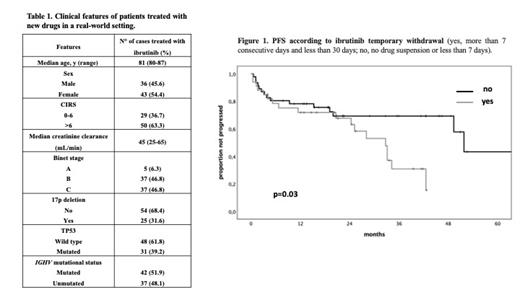Background: Although CLL primarily affects older adults (median age 71 years), limited data exist about the outcomes of adults who are ≥80 years old because they are under-enrolled in clinical trials.
Methods: We performed a multicenter national study enrolling consecutive treatment-naïve CLL patients ≥80 years at the time of frontline CLL therapy, treated with ibrutinib. Kaplan-Meier analyses were used to plot progression-free survival (PFS) and overall survival (OS).
Results: Our study included 79 patients with CLL who were aged ≥80 years at the time of frontline CLL therapy starting between 1/2014 and 3/2021; the clinical features of these patients are summarized in Table 1.
A total of 13 (16.5%) patients achieved a nodal clinical response (CR; bone marrow evaluation was not performed), 58 (73.4%) a partial response (PR) or PR + lymphocytosis (PR+L), 3 (3.8%) a stable disease (SD), and 5 (6.3%) were not evaluated since they early withdrew ibrutinib. Discontinuation because of progressive disease (PD) occurred in 9 cases (11%), whereas discontinuation due to toxicity in 11 patients (13.9%).
The most common grade >3 adverse events (AEs) were infections (25.5%), neutropenia (10.1%), and anemia (2.5%).
Eighteen patients (22.8%) experienced cardiovascular events: 9 (11%) had atrial fibrillation (AF), 5 hypertension (6%), 3 heart failure (3%), and 1 acute coronary syndrome (1%). All cases of AF and hypertension were of grade 2. Patients with AF received anticoagulation and no thrombotic stroke were recorded. Bleeding events were observed in 27 (34.2%) patients but were mild, of grade 1-2 in 24 and grade 3 in 3. Patients who received anticoagulants or anti-platelets drugs did not experienced a significantly higher rate of hemorrhagic events than those not assuming anticoagulation. Secondary malignancies were reported in 6 patients (7.8%) and Richter's transformation in five.
Temporary drug withdrawal (7-30 days) occurred in 33 patients (41.8%): in 17 (21.5%) due to infections, 5 (6.3%) cardiovascular events, 10 (12.7%) hemorrhagic events, and 4 (5.1%) hematologic toxicity. Ibrutinib was permanently discontinued in 26 patients (32%): in 9 with PD (Richter's syndrome, 5), 6 with secondary malignancies, 5 with infections, 3 with cardiac failure, 2 due to severe bleeding and a sudden death was reported in 1.
After a median follow-up of 24 months, the median PFS was 49.3 months (95% CI 39.9-58.7) and the median OS 51.8 (95% CI 50.1-53.5). Age, sex, creatinine clearance, Binet stage, del17p, TP53 and IGHV mutational status did not significantly impact PFS. Conversely, CIRS >6 was associated with a significantly shorter PFS (median PFS: 33.1 months, 95% CI 25.3-40.9 vs. not reached, p=0.016). A significantly longer PFS (p=0.03) was observed in the 46 patients who never discontinued ibrutinib or stopped the drug for less than 7 days (median PFS 66.3 months, 95% CI 50.5-82.1) compared to those with a transient treatment discontinuation, between 7 and 30 days, (median PFS; 32.7 months, 95% CI 23.2-42.3) (Figure 1).
Sex, creatinine clearance, Binet stage, IGHV, del17p, and TP53 mutational status, as well as CIRS, did not significantly impact OS. Conversely, a trend toward a statistically significant longer OS (P=0.07) was observed for patients who discontinued ibrutinib <7 days (67.2 months, 95% CI 43.5-90.9) compared with those who discontinued for 7-30 days (51.8 months, 95% CI 34.4-69.2).
Conclusions: To our knowledge, this is the largest real-world study examining treatment-naive elderly patients receiving ibrutinib as first-line therapy.
Ibrutinib represents a suitable therapeutic choice even for patients aged >80 years with comorbidities. In this setting of patients, the drug was well tolerated and no new side effects were recorded.
Disclosures
Mauro:Abbvie, Janssen, Beigene, Astra Zeneca, Takeda: Membership on an entity's Board of Directors or advisory committees, Research Funding, Speakers Bureau. Reda:AbbVie: Consultancy; Astrazeneca: Consultancy, Current Employment; Jannsen: Consultancy; BeiGene: Consultancy. Laurenti:Janssen: Membership on an entity's Board of Directors or advisory committees; Beigene: Membership on an entity's Board of Directors or advisory committees; Abbvie: Membership on an entity's Board of Directors or advisory committees; AstraZeneca: Membership on an entity's Board of Directors or advisory committees. Visentin:AstraZeneca: Membership on an entity's Board of Directors or advisory committees, Research Funding; Abbvie: Consultancy, Membership on an entity's Board of Directors or advisory committees; Janssen: Membership on an entity's Board of Directors or advisory committees; BeiGene: Membership on an entity's Board of Directors or advisory committees, Research Funding; Takeda: Speakers Bureau; CSL behring: Membership on an entity's Board of Directors or advisory committees. Pepe:Abbvie, Astra-Zeneca, Beigene: Membership on an entity's Board of Directors or advisory committees, Other: travel grant. Murru:Abbvie, Janssen, Astra Zeneca: Membership on an entity's Board of Directors or advisory committees, Research Funding, Speakers Bureau. Sportoletti:Abbvie, Janssen, Beigene, Astra Zeneca, Takeda, Novartis: Membership on an entity's Board of Directors or advisory committees, Research Funding, Speakers Bureau. Tedeschi:Beigene: Speakers Bureau; Janssen: Speakers Bureau; Abbvie: Speakers Bureau; Astrazeneca: Speakers Bureau. Rossi:AbbVie, AstraZeneca, Gilead, BeiGene, BMS, Janssen, Lilly, Kyte: Honoraria, Research Funding.


This feature is available to Subscribers Only
Sign In or Create an Account Close Modal